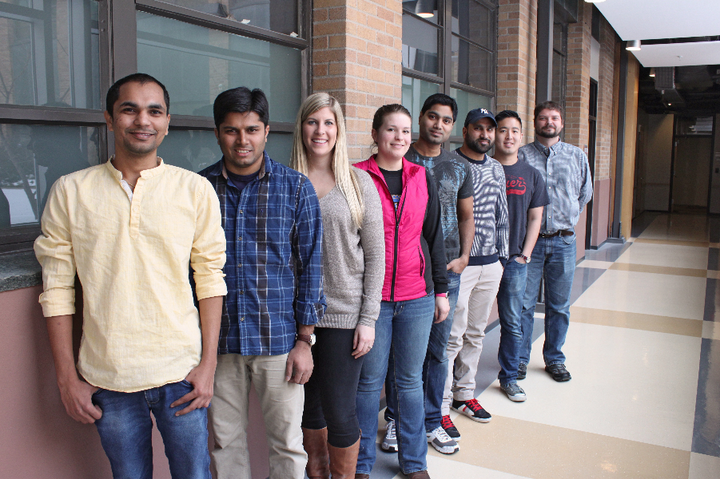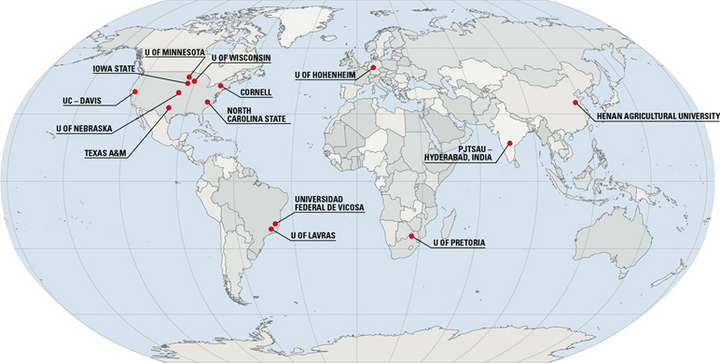March 4, 2015

With the ever increasing population and changing climate, next-generation plant scientists are challenged with providing solutions to complex food problems. Along with development of newer technologies for the advancement of science, continued success in plant sciences can be achieved by meaningful public-private networking among scientists and students. A March 29 symposium at UNL provides an opportunity for such networking among students and individuals from academia and industry.
The theme of this year's symposium "Exploiting and Enhancing Genetic Variation: Addressing the Future Challenges for Plant Breeding" focuses on how recent developments in technology, molecular biology, genetics, and epigenetics can be used to improve plant breeding efforts, as the urgency to raise crop productivity increases in the face of climate change. The day’s agenda includes presentations from professionals in academia and industry, student research presentations, and a student research poster contest. Invited speakers are leading plant scientists, including Jim Holland, USDA-ARS North Carolina State University; Jesse Poland, Kansas State University; Timothy Close, University of California Riverside; Sally Mackenzie, University of Nebraska-Lincoln; and Wendy Srnic, DuPont Pioneer.
This is the third biennial UNL-Plant Breeding Symposium. It is being organized by graduate students from the UNL Department of Agronomy and Horticulture, along with David Hyten, faculty mentor and associate professor in the UNL Department of Agronomy and Horticulture (Figure 1). The graduate students anticipate great success at this year’s symposium as the 2014 UNL plant breeding symposium attracted 135 registered participants and 100 online webinar viewers. The science-based forum will also highlight select student research. The student talks are part of a university-wide abstract contest. In addition, cash prizes will be awarded to the top three winners of the research poster contest. Students interested in presenting their research are encouraged to submit an abstract to compete for the presentation and/or poster contest. Presentations will be recorded and archived on the web for later viewing.
Initiation and Past Symposiums

The initiative effort for these series began with DuPont Pioneer at the University of Minnesota in 2008. Through joint initiative, the goal of the symposium was to enhance agricultural scientific literacy, stimulate collaboration, and help build interest in plant breeding careers. Since then, DuPont Pioneer has expanded the series to other institutions to better define the symposium series’ objectives. So far 50 such events have been organized at 16 universities around the world. The symposium has reached more than 8,000 participants spanning five continents and seven countries (Figure 2). The network is confident of reaching more researchers and more from the public in the years to come.
Student members from the scientific societies involved in organizing the symposium take great responsibility in improving science literacy by reaching out to the public at large. The event is marketed through social media, free symposium registration, free webinar streaming and archiving, and publicity in local and national papers. Students use social media like Facebook, Linked-In, and Twitter to advertise. Recently, students are also directly involved in efforts in educating the public about science through the opportunity to present their research through an oral presentation or poster. The student research poster sessions and student oral presentation have given students the chance to share their research with fellow researchers and to gain valuable suggestions and feedback along with creating an environment for learning, collaboration, and discussion. Cash prizes are awarded to selected posters and student speakers in these symposiums. The exercise of explaining and advocating your work is critical for developing communication skills that are more impactful on the public.
Beyond practicing scientific communication to a lay audience, graduate students have the opportunity to take part in all the process of organizing the seminars including budgeting, selection of speakers, arranging for their travel and accommodation, preparing the program and managing registered participants for the symposium. Students work with a fixed budget provided by DuPont Pioneer with additional funding from their home departments to meet the costs of the symposium. Participation in organizing the symposium offers students the opportunity to practice professionalism and competence. Involvement encourages professional development and also offers many opportunities of informal learning such as team leadership and managing money.
Symposiums at Participating Universities in 2016
With guidance from Dr. Tabare Abadie, Senior Research Manager for DuPont Pioneer, participating universities are conducting severak plant breeding symposiums in spring 2016. Following is a list of upcoming symposiums in spring 2016.
- March 11 — Cornell University “Breeding for the Emerging Global Middle Class”
- March 29 — University of Nebraska -Lincoln “Exploiting and Enhancing Genetic Variation”
- April 8 — University of Minnesota, “Plant Breeding: Rooted in Education”
- April 18 — University of California - Davis, “Breeding for Stress Resilience”
- May 31 — University of California - Berkeley, “Gene Editing”
Symposiums were conducted earlier this year were North Carolina State University, "Looking to the Future: Integrating Insights and Innovations in Plant Breeding;" Texas A&M University, “Healthier Food for a Healthier World;” and Iowa State University, “Thinking Outside the Yield Box.”
Events will be held later in 2016 at University of Wisconsin-Madison and University of Illinois Urbana-Champaign as well as in Brazil, South Africa, China, India, and Mexico (CIMMYT). The symposiums encourage participation of attendees across the series.
UNL Event
You can attend the March 29 symposium in person or via webianr. You also can follow conference discussion live on Twitter using the social media hashtags #PopAgriculture or #UNLPB2016. For more information and to register for this event, visit http://agronomy.unl.edu/pbsymposium.
Sunil Kumar KR and Leah Ruff
Graduate Students, Department of Agronomy and Horticulture
UNL Institute of Agriculture and Natural Resources
